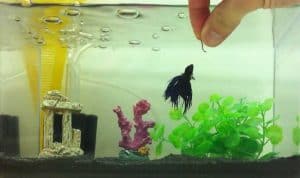
If you have decided to feed bloodworms to your betta fish, you have to consider the quality and safety of the food. Although the ideal food for bettas is live bloodworms, freeze-dried varieties can be beneficial as well. This article will cover the benefits of both. In addition, we’ll discuss the proper way to purchase and store bloodworms. Also, we’ll talk about how to safely feed frozen bloodworms to betta fish.
Contents
Live bloodworms are ideal
When it comes to food for your betta, live bloodworms are the best choice. Bettas will eat just about anything in the water that moves, so they will happily eat aquatic insects or worms. Live bloodworms are softer, more digestible, and more interesting to the fish than pellets. Here’s how to give your betta the best nutrition possible.
The best way to feed your betta fish live bloodworms is by breaking them open and soaking them in water for a few hours. This allows the bloodworms to expand and digest properly. If you purchase frozen bloodworms, make sure you follow the instructions on the package carefully. Don’t just drop the whole cube into the tank–rinse each one before serving!
Freeze-dried varieties are also good
Both live and freeze-dried bloodworms are excellent for your betta. However, there are some differences between live and freeze-dried bloodworms. For example, live bloodworms will sink in the water, while freeze-dried ones float in the tank. Both are equally nutritious, but some people are more concerned about the size of the bloodworms.
Live bloodworms are best for your betta because they provide mental stimulation and prevent boredom. They can also be used for breeding, which will trick your fish into thinking that breeding season is right around the corner. However, live worms have a shorter shelf life than the freeze-dried ones. Also, they must be kept in the fridge for about two days before they will lose their nutritional value.
Buying from a pet store
Buying bloodworms from a pet shop for betta fish is an excellent idea because these critters are not only tasty, but they also give your betta much-needed mental stimulation. They’re also perfect for breeding as they trick your fish into thinking it’s breeding season. However, live bloodworms are more expensive than frozen worms and only keep well for two to three days in the fridge. Moreover, live worms carry a higher risk of transferring parasites from their hosts, so be sure to buy from a reliable source.
Some hobbyists choose to breed their own bloodworms in separate aquariums so that they can monitor the worm population and the health of their betta. However, if you’re buying bloodworms from a pet store, they are likely to contain parasites. Instead, look for parasite-free bloodworms at aquarium-specific stores. They can be bought in a variety of sizes and shapes.
Storage of frozen bloodworms
If you can’t access live bloodworms often, storing frozen ones in your tank is a great option. Bloodworms are available at many local pet stores and are usually sold in individual cubes or slabs. You can break off portions of a bloodworm to feed it to your fish. Freeze-dried bloodworms contain good nutritional value and are easy to store. They can last for about 6 months if properly stored. They’re easy to cut and portion, and you won’t have to worry about them getting diseased.
Bloodworms should be stored in water that is not too cold or too warm. Too much can be dangerous for your betta. An excess of bloodworms can cause a dangerous ammonia spike in the tank. A spike in ammonia can kill your betta. The water in your aquarium can also become too toxic if the bloodworms rot before you can remove them. Your fish can also get sick from eating too much bloodworms. It may also get constipated if you store freeze-dried worms in its tank.
Effects of too many bloodworms on betta fish
If you are worried about feeding your betta fish too many bloodworms, you’re not alone. Many betta owners don’t realize how much bloodworms are bad for their fish. The problem is that bloodworms are often much bigger than betta fry. However, your fish will prefer these if they move around. Aside from eating too many bloodworms, too much bloodworms can cause digestive problems and laziness in your betta fish.
Although bloodworms contain lots of nutrients, they aren’t the healthiest food for your fish. They must mature to become midge flies before they can reproduce. Some betta hobbyists have even tried breeding their own bloodworms. However, this method is expensive and only lasts two or three days. Also, live bloodworms are highly perishable if not stored properly.



